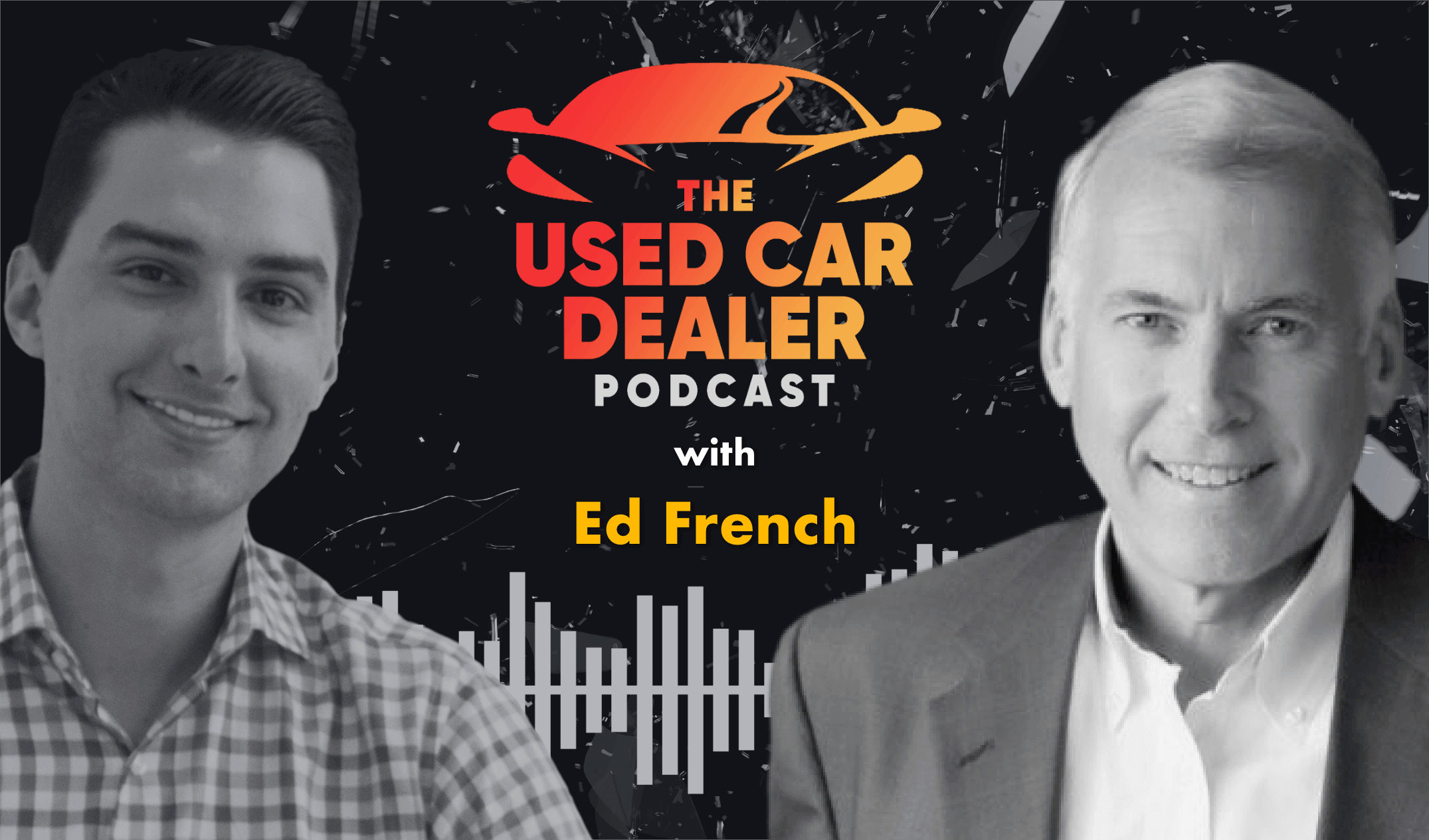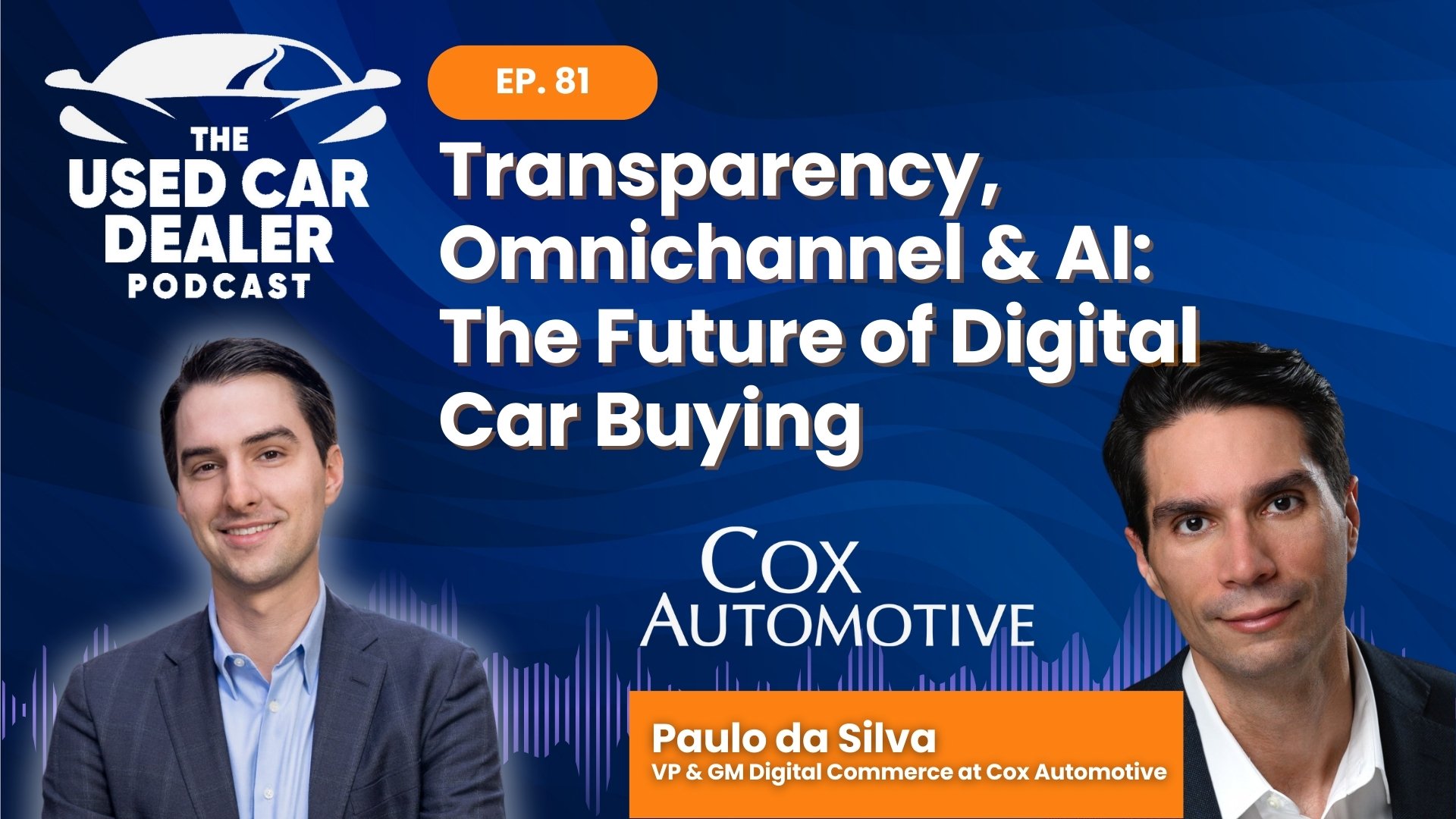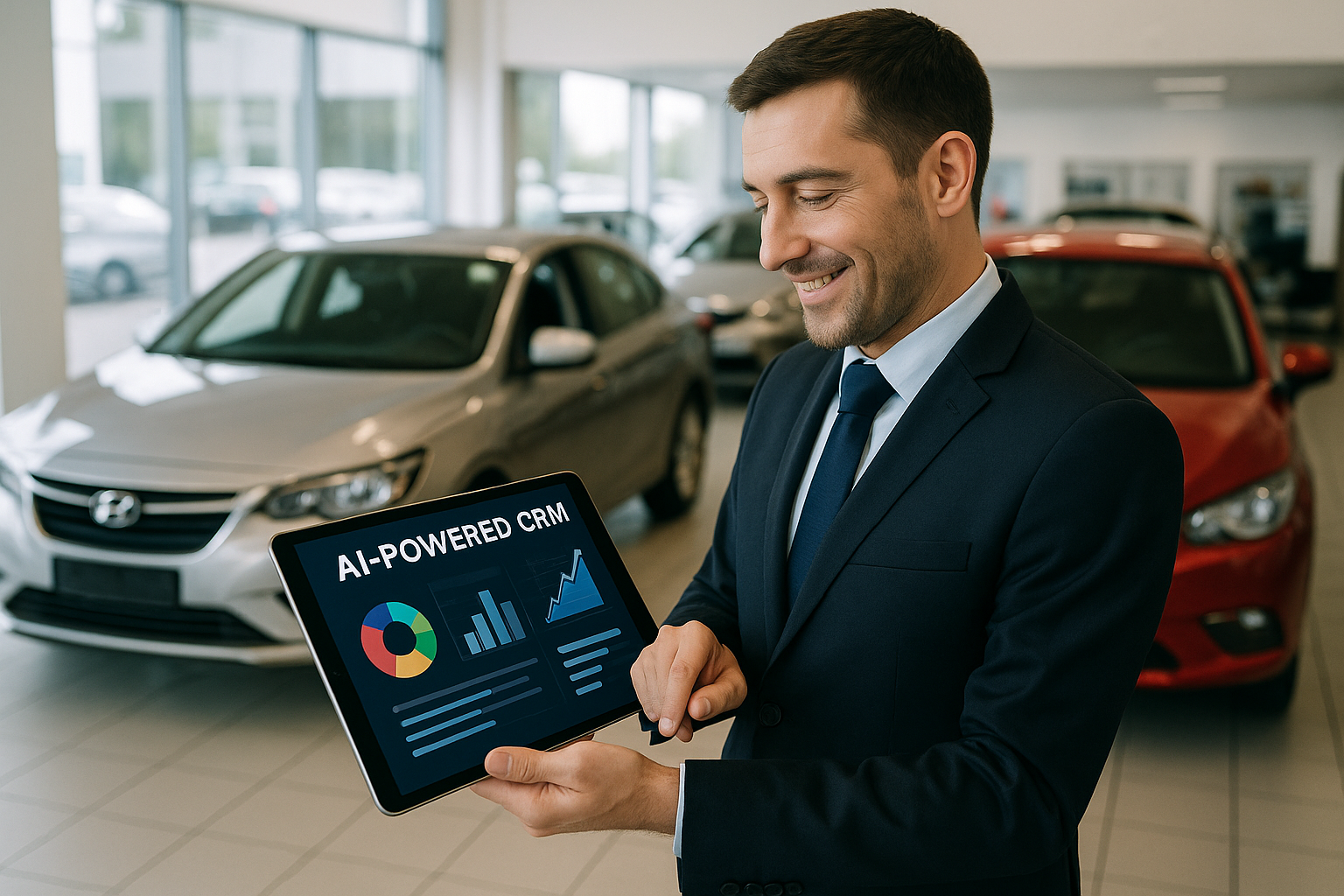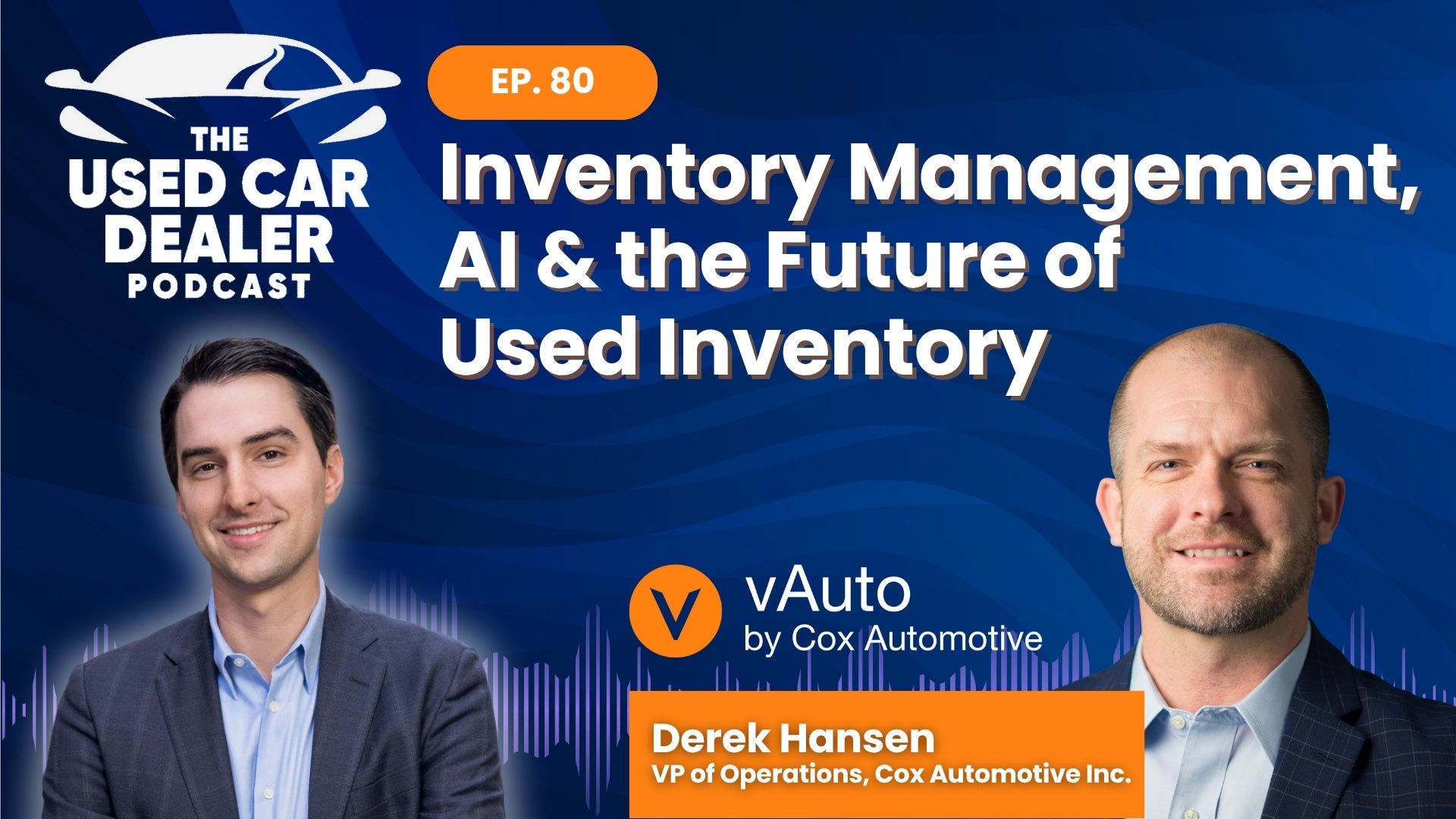In this blog post, we have transcribed the UCDP interview with Ed French in written format. You can listen to the original podcast here.
Zach: Well hello, It’s Zach and we have another episode of the Used Car Dealer podcast. And we have a special guest today: Ed French who is the president of Auto-Profit Consulting. And Ed, tell the audience a little bit about yourself and how you got into the business.
Ed: Thanks for having me, Zach, and I really appreciate the opportunity to be with you and be on this podcast. And hopefully, we can share some of the things that I know are working out there in retail automotive.
I got started in the business, Zach, in 1973, so I guess that dates me as the oldest guy on this podcast. But I started actually through the fixed operations. So, I was a service technician, a service adviser, and a parts manager, and a service manager. And through a series of folks that believed in me, actually moved from the fixed operation to the variable operation side of the business. And in the late 70s and early 80’s, I was a salesperson, finance manager, used car manager, new car manager, general sales manager.
In 1985, I actually purchased my first new car franchise and from that point on, I’ve been either a chief operating officer, a director of operations, a dealer principal from basically 1985 all the way up ‘til 2011, when I moved into semi-retirement and started a consulting business and moved from the Midwest to my residence in Fort Myers, Florida. And since 2011 worked with both--all sides of the business – dealer clients, OEMs, vendors that serve the industry.
And I have really seen a lot, traveling from coast to coast, working with those folks, learning about what works best, where the friction is in today’s processes. And it’s been an interesting journey this year, Zach, I’m celebrating 47 years in the automotive industry. So, I’ve seen a lot. I’ve seen prime at 21% now I see it close to zero and I’ve seen gas at $5 a gallon and I saw it at about 69 cents too.
So, I’ve seen a lot. So the good news is, pretty much nothing scares me in retail automobile business cause we’re pretty resilient folks out here in this industry
Zach: Agreed, and let’s talk about the changes from, like, March and April when COVID-19 first started to take mindshare to now, and what you’ve observed in the marketplace and your consulting business.
Ed: Well, sure, I mean obviously, you know, my clients started calling me in earnest around late February and early March with certainly several degrees of panic, Zach. You know: ‘what’s going to happen, inventories are’--’I’ve got way too many cars, they’re all overpriced, and the markets in freefall, customers are in lockdown, my processes don’t allow me to do business virtually, you know, ‘my website isn’t current’, you know.
All the things that quite frankly, Zach, I have been telling clients and encouraging them to make the changes, to transform their business into a frictionless experience, digitally. You know it’s really hard, Zach, to tell multi-millionaires to change their processes that made them multi-millionaires in the first place.
So, you know, there isn’t anything like a good pandemic to get everybody straightened up. You know the biggest changes, frankly, have been in the digital aspect, in remote workforce, and in the efficiencies of their operation--being able to actually create deliveries and throughput and service operations with less people--really leveraging the software that’s available to help them become more efficient. You know, doing more with less has always been a hallmark of automotive retail. So, I saw it, live and in action, you know we were in the depths of doom in April
And then gosh, by the middle of May, everybody’s like ‘wow, business is good again’ and you know the caution that I give everybody, that will be listening to this podcast is, you know, as we stand here on the 29th of September, you know, business is starting to soften a little bit, the pent-up demand has been filled, new car inventories are back.
So the changes that we saw to our businesses in March and April, we’re about to see them happen again. Where all the greatness that we enjoyed coming out of April--the reality is we still have 10 percent on employment, we still have a market, new car market that is not a few million units off of where it was projected to be, those cars are forever lost, you know, we’ll get them--you know, eventually we’ll get them back into the system, but they’re forever lost this year.
And I guess the key takeaway, if I was to give it one word, was “resiliency through efficiency” is the phrase that I would use--that everybody just became more resilient and got more right with less by leveraging software. So that’s a long answer to your question, Zach, but we have to learn how to reinvent our business and do less face-to-face and more remote.
Zach: Interesting. You recently posted on LinkedIn about a concept you call, MWBA, explain to the audience why that’s important and why that’s timely right now
Ed: Well, it’s Managing By Wandering Around. And you know, I think that during times like this, dealership senior leadership has to lead from the front and, you know, you can learn a lot by getting to your store and watch it wake up.
That was probably the most prolific thing that I learned by doing this was getting to the store at 6:30 in the morning and actually watch the store wake up, watch the employees come in, watch the service department wake up, watch the service director arrive, you know, take time to talk to everyone on the fixed operation, get a general pulse of the fixed operation, you know, watch the service drive process; are recommended upsales being performed?
You know, a lot of the customers would come in and wait, I’d actually buy them a cup of coffee and sit down and chat with them for a minute, to actually determine what their feelings were about our processes that we’re actually using. You know, until you’re watching your processes live and watch your employees come to work, it’ll show a lot about the pulse of your store.
And you have to live by love, Zach. You have to love what you do and you have to be able to say, “you know I’m gonna lead by loving all of my employees and make sure that everyone in my store gets a chance to succeed.” I think that’s probably the thing that Managing By Wandering Around (MWBA) gives you. It gives you a chance to get that human touch and lead by love in your operation.
Zach: Got it. And, inventory management, that’s a real hot topic in today’s market. What should dealer operators be doing to set themselves up for success in sourcing inventory?
Ed: Well obviously, sourcing inventory is a hot button for every retail dealer and to be perfectly honest to you, we have to begin to look at the unnatural sources. The natural sources are place returns, go to the auction, go to an online auction. But we really have to focus on the two major areas where the biggest opportunity exists and the least efficiency is, and that is in trade-ins and our process for trade-ins, our appraisal effectiveness, our appraisal processes and then certainly last but certainly not least is our private seller acquisition strategy.
The inefficiency that exists in those retail stores with consumers when they want to dispose of their vehicle does not exist in those retail operations. In other words, we don’t have a process for a consumer that just wants to sell us their car. We do not have any infrastructure built, we don’t have any software that helps the customer walk through the process.
Generally, it’s the used car manager who ends up talking to the customer. There isn’t any software that co-exists where the consumer could validate through a third party. It’s generally just another appraisal as opposed to an experience.
You know selling your car is as important as an experience, as the experience in buying a car, Zach. And that disconnect, that’s where the disruptors are making major headway. They’re creating an experience for a consumer to sell their car. It shouldn’t be painful, it shouldn’t be hard. It should be easy, it should be fun, it should be exhilarating, it should be filled with transparent data.
And if retail dealers don’t get anything else out of this podcast other than that, it’s: build a department, build a process, and build an experience around consumers who want to dispose of their present vehicle and make it part and parcel of how you would think about reinventing your appraisal process.
Most appraisal processes, Zach, are broken. They don’t include third-party validation. They don’t include side-by-side walk arounds. They are generally speaking one person’s opinion matched up with a software tool that doesn’t understand your total market strategy and will allow a software tool and one person’s opinion to definitively decide the consumer’s experience in trying to either trade or sell their car. It’s got to change if you wish you’re gonna be successful.
And it’s the number one thing on the radar of the disruptor, Zach. They are big on this, I think everybody knows that and they are absolutely out for blood in this area, and they’re gonna win if we don’t wake up and get it focused around the experience and transparency.
Zach: I couldn’t agree more, and what are your thoughts on Carvana and Vroom and what they’re doing from the trade-in perspective?
Ed: Well, they’re obviously industry leaders in this and they’ve spent a tremendous amount of time and effort studying consumer behavior and the pain and friction that comes from a consumer who just wants to dispose of their car and get capitalized on it.
They’ve built phenomenal algorithmic software programs that make it easy for the consumer to get a transparent price on their vehicle. They’ve created a cultural experience by removing all of the traditional roadblocks, from picking up the car, to the transfer of funds, to the validation of the condition of the car, to arriving at a fair and equitable value for the vehicle.
They’ve eliminated all of those headwinds and friction and clearly they understand, because they’re not--they don’t have--those disruptors don’t have the advantage than those franchise dealers, they don’t have a built in trade in system. So, they have to focus on this if they’re going to have inventory and acquire vehicles, and to be perfectly honest with you, they’re gonna win if we don’t wake up.
Zach: Interesting and many used car dealers right now, they’re running with smaller teams, maybe they have furloughed or fired some employees during the pandemic, and owners and operators they have to make tough decisions. What advice, from a management perspective, do you have for operators during the pandemic?
Ed: Well, I think you have to really look at how efficient can your operation be, and look at the software tools that potentially could be out there to help you create 1.5 people combining .5 the software, with a very productive person--where you don’t have to have the numbers of people that you had, if you leverage your software tools.
There is a phenomenal array of software tools available for dealers right now that will actually help streamline your operation. But most importantly, what you have to do is wipe away most of the legacy that causes dealerships to be inefficient.
So in other words, here's what I would encourage all dealers to do, Zach. Take a whiteboard and put your present selling process up on the whiteboard and then ask yourself the following questions. When was the last time that selling process was modified? Then take your digital selling process, in other words, your website and ask yourself these questions:
- ‘Does it have the same process that you can get in-store?’
- ‘Do you have different tools that are on your website that are not available in-store?’
- ‘And does your sales and desking process both in-store and online make the customer happy, make the employee happy?
- ‘Does it create transparency, does it have credibility?’
- ‘Can your employees really execute?’
Most selling processes I see Zach are too complicated. You know, what we have to really think about is, your outbox is empty, there aren’t any ups on it anymore. They all start digitally and to do that, what we have to do is combine the digital online store. I want everybody to think about their website as an online store.
Think about your website as Shopify. If you had Shopify as your website, it would be an online store. it would be complete. It would have document download. It would have all of the specifications for a consumer to actually be able to transact. It would have all the tools for consumers to validate the product. It would have finance choices. It would have enough for a trade-in price quote. It would have a return policy. It would have all these things.
So the answer to the question is, you can do more with less, from an employee standpoint, if you make it more efficient for your employees to execute. And most selling processes, Zach have not been modified in the last 48 months. And we had major modifications in March and April, and we all scrambled to modify what we were doing and then all of a sudden, business got good again, Zach and everybody, just went back to where they were.
Here’s a newsflash for everybody on this podcast, business is never going to be just back to the way it was in January and February. We are forever modified and what we have to recognize is this is the time as retail dealers, to modify our processes, to make them efficient and streamlined and frictionless, so that you never have to have two employees doing the job of one.
Because we don’t know what’s around the corner. It’s probably not another pandemic, but we’re sitting here with 10% unemployment, we’re sitting here with some economic uncertainty. Yes, it translates to an all-time low but I’m not sure that I want to go on a hiring spree right now and that leaves me with one way to become more efficient and that’s over-indexing and utilizing the software tools.
Zach: That’s a good point. And this leads into my next question, when most used car dealers think about the word capital, they think about funding needed to acquire inventory to run their business, there’s also human capital and in an industry where there's historically a very high turnover rate, what's the importance of human capital when it comes to dealerships?
Ed: Well, it’s the number one asset we have, you know. I believe that salespeople and sales managers are the number one asset, they’re the strongest, and the way that you compensate them, the way that you lead them, the way that you motivate them, the way that you, frankly, that you hire them, the onboarding process, you know.
Specifically, when you think about the younger employees, you know, millennials love to know the why, and if you don’t give your employees the why behind what you’re doing, why you’re doing it, what’s in it for them and let your employees give you lots of feedback, make those one-on-ones impactful, and I think the role of senior leaders or dealers is we have to paint a vision within our store and create that culture that every employee has a purpose within the organization, and it’s the purpose of a higher good.
You know, I don’t want my salespeople to think that they sell cars, I want salespeople to think that they provide a service, to improve the lives of their customers because without a car, you can’t get the kids to school, even though they may be homeschooled sometimes, they can't get to their work, they can’t provide good cultural learning experiences by going on trips, they are creating, they are helping customers have a better life by having a vehicle and that’s the vision, and that’s the purpose of us being in the retail car business.
Yes, the income that we derive is a direct result from consumers validating and understanding and acknowledging that the higher good of an automobile makes their life better. We are improving people’s lives.
And if you surround your employees with technology, if you personalize their experiences, if you create that team environment, if you have that culture of activity, if you make those one-on-ones impactful, you’ll win.
You won’t have turnover but it’s all about how did you hire them, how did you bring them all in, how did you onboard them and how culturally they feel like, they’re making an important contribution to society by being in the car business. As opposed to, “you're gonna be here from bell to bell”, “we’re not gonna pay you very much”, “and we’re not gonna train you, we’re just gonna speak in a conference room with a couple of old CDs and watch--and let you learn those things”.
Employees today want to know that they're doing something that will help others and that they are actually making a difference within your store. The summary of that Zach is, if your employees don't feel like they have a purpose in the organization they’re leaving and it’s our role and responsibility and obligation as senior leaders to make sure that everyone in our organization knows they have a purpose.
Zach: Understood. and, some car dealers have or used car dealers have service operations while many do not and to move on to another topic, why should or shouldn't a used car dealer operator consider service components to their business?
Ed: Well, I think it’s where the separation comes from the level of experience that a customer might receive. Think of it as concierge, you know the disruptors for the most part don’t have service. You know CarMax is the one exception to that but Vroom, Carvana, you buy a car and you’re more or less on your own and when you have trouble, all you get is a call center that directs you to an independent third-party repair facility.
So, the fact that we, even though we may do it ourselves, in other words we might sublet it out to a third party repair operation. It’s the level of concierge, it’s the feeling or the experience. You know, Zach, we don't sell cars, we sell an experience. We don’t service cars, we have a service experience.
And I think what we have to recognize is as independent dealers specifically, we have to recognize that concierge level of service is what the disruptors are unable to do and because they’re operating out of a gigantic call center in either Phoenix or Dallas or wherever the home office of these disruptors might be.
As a smaller independent dealer if you offer concierge service and you offer to take care of it, as opposed to having the customer being left out there by themselves. You are a leader already, you fit right in the middle between the franchise dealer that has service and the disruptor that does not, and that is a great spot to be. So for anybody that’s thinking about it, I’ll offer service even though I may not be repairing the car myself. In other words, I’m getting it repaired.
Zach: Any reasons why a dealer--It might not make sense for, like, a used car dealer to have a service component of their business or any risks or cons to having a service department?
Ed: Well, I think the service department is a capital investment, both in facility and equipment, and it is the separator as I mentioned earlier, you have to make a--the pros are, you're going to be forced into this level of experience and service by your consumers or they will no longer include you in their experience because when there is something that occurs with the car, the first person that they’re going to revert back and go to, frankly, is going to be their selling dealer. So if you don’t offer the service or at least the ability to concierge it, you’re already in second place.
Zach: So, the concierge I assume you would mean, like, if there’s another service center or a used car dealer bringing it to that service on their --- got it
Ed: Yes, yeah and I think that's frankly where I see a lot of independence going is offering the concierge service, in other words, ‘we’ll take care of it for you, you don't have to do a thing’ and how we might be subletting it out ourselves because we elected not to make the capital investment, it's still--we are--we still maintain ownership with the customer.
Think about this Zach, if you sell me a car and you don't have the service operation and I go to a place that now has a service operation even though they may not sell cars, whose customer did I just become? The service operations.
I don’t want to lose. Retention of customers is paramount. So, if I maintain control by offering a concierge service. Frankly, I don't lose control of the customer, if I send my customer to somewhere else--this will be the downfall of the disruptor, Zach: It's because they are losing control of their customers once they sell them a car, it will be the headwind that they face the most.
Zach: So, I guess Ed to kind of close things out, where do we go from here and what are some of your future predictions in regards to used car marketplace?
Ed: The disruptors are gonna get bigger. They have an appetite for growth, they have money behind them, and they are innovating as we speak.
So as I--I think that my prediction will come true: the disruptors--there will be more entering the space, that means that there will be less and less for the smaller and mid-sized folks to capitalize on from a growth standpoint unless you become ultra boutique: meaning focus on a segment, focus on your customer service, focus on your digital assets, become Carvana- or Vroom-esque in your processes but you have a personalized touch on top of them.
I think the used car marketplace is going to go through an evolution in 2021. I think there’s gonna be plenty of cars to choose from. I think there’s gonna be a pretty significant price adjustment in 2021. I think that the CPO business is going to become even more robust, I predict that the CPO will be four out of ten vehicles sold. Right now, it’s within the 20s--I think it’s going to double and it’s going to double, I think, Zach, because we've got so many off lease vehicles.
And frankly the affordability factor of new vehicles--we saw this in May, June and July--customers were automatically making a decision to buy a CPO or a late model vehicle as opposed to a new one because there weren't any new ones available. And I think as new vehicles become more readily available and economic uncertainty continues, I think the CPO business has a huge growth there, for dealers.
So to summarize your question, I think--I’m very bullish on the used car business. I’m very bullish on the adjustments we have to make but you gotta have a different mindset about your inventory distribution, you have to effectively measure your attributes, meaning your pricing model, your inventory health, your price adjustment, your cadence, your website, turning it into an online store.
And you have to pay special attention to the trends and allocate resources to create a very robust consumer experience and we’ll all be winners in the used car market
Zach: Very well put Ed and I really appreciate that you’d taken so much time out of your day today to be in the used car dealer podcast. Thank you so much
Ed: My pleasure, Zach, thank you.



.png)




.jpg)
.jpg)
.jpg)
.jpg)

.png)
.png)
